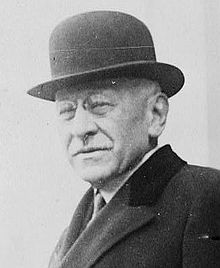Rosenwald (film)
Rosenwald is a 2015 documentary film directed by Aviva Kempner about the career of American businessman and philanthropist Julius Rosenwald. It debuted on February 25, 2015 at the Washington Jewish Film Festival.
Synopsis
The documentary features interviews with a number of people, including Peter Ascoli, grandson and biographer of Rosenwald, Julian Bond, Stephanie Deutsch, Richard J. Powell, Eugene Robinson and George C. Wolfe.
The film begins with an account of Rosenwald's rise from a job in the clothing business of his father, a German-Jewish immigrant, to the chairmanship of Sears-Roebuck, which he then builds into the world's largest retailer. Shocked by reports of anti-Jewish pogroms in Russia, he realizes that America's treatment of Negroes is no better and marshals his fortune to improving their condition. He develops a friendship with Booker T. Washington, helps Tuskegee Institute and then begins building schoolhouses for Negro children across the American South. With fundraising and sweat equity participation from local communities, he manages to construct 5,357 Rosenwald schools by the time of his death in 1932, about one-third of all elementary schools available for African Americans prior to the end of U.S. school segregation in 1954.
Other Rosenwald-supported projects depicted in the film include establishing 25 YMCA-YWCAs for African-Americans, founding the Museum of Science and Industry, building the Michigan Boulevard Garden Apartments, a housing project for blacks moving to Chicago, and helping pay for the training the Tuskegee Airmen. The documentary concludes by chronicling the impact of the Rosenwald Fund which awarded grants to many black artists and writers in the mid-twentieth century, including a large number of well-known African Americans.
Reception
Box office
The film had grossed $412,511 as of 5 November 2015.[1]
Critical reception
The documentary has received extremely positive reviews from critics. On Rotten Tomatoes, the film has a rating of 93%, based on 30 reviews, with an average rating of 7.8/10. [2]
Positive reviewers included The Wall Street Journal,[3] The Christian Science Monitor, [4] and rogerebert.com.[5]
Accolades
- Nominated for Grand Jury Prize at the 2015 Nashville Film Festival.
References
- ^ "Rosenwald". Box Office Mojo. Retrieved 9 November 2015.
{{cite web}}: Italic or bold markup not allowed in:|website=(help) - ^ "Rosenwald (2015)". Rotten Tomatoes. Retrieved 9 November 2015.
- ^ “Rosenwald" Review: Doing Well, Doing Good by Joe Morgenstern, The Wall Street Journal
- ^ "Rosenwald" provokes gratitude for the deeds of its subject, by Peter Rainer, The Christian Science Monitor
- ^ rogerebert.com review by Matt Fagerholm 3-1/2 stars out of 4

